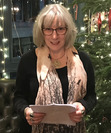Paula R.C. Readman's Blog, page 42
June 16, 2021
Old English, No Jacobean
 William Shakespeare
William ShakespeareWhether being dyslexic has made me more interested in words than a non-dyslexic I can’t answer, but the one thing I do know for sure is I’ve always been fascinated in where words come from originally and their history within our British language.
Like all languages, ours is a living thing that has changed over the centuries, and is still evolving as we come in contact with different cultures, and as new technologies bring with them their own words too.
During the Elizabethan era, one man added 1700 new words to our language and these words were coined by him. In total, he introduced about 17000 English words through his plays and writing. William Shakespeare was born in 1564 during the reign of Elizabeth the first, but most of his more popular plays were written after her death, so in reality he was a Jacobean writer.
 From Pixabay
From Pixabay By the end of the medieval period Old English, once known as Anglo Saxon and was spoken in areas of Southern Scotland and England between 5th and the 12th century was seen as the bases for the modern English language we speak today. We now address the so-called Elizabethan or Shakespearean era as Early Modern English even though to our ears it would be hard to understand the spoken and written words.
What Mr Shakespeare did was change a verb into adjective or nouns into verbs by adding prefixes and suffixes to coin a whole new word, and connect words that were never used in combination earlier. It would have been interesting to know whether his audience were confused by him doing this, or whether his actors questioned his usage of these new words.
 From Pixabay
From PixabayHere are some of the words invented by Shakespeare:
Accommodation : amazement : assassination : barefaced:
Baseless : to bedazzle : belongings: to besmirch : cold-blooded :
Coldhearted : countless: courtship : dawn (as a noun) : day’s work
deaths-head : to dishearten: to dislocate: distasteful (Shakespeare meant ‘showing disgust’): distrustful: eyewink: fair-faced: fairyland: fanged : footfall: foppish
foregone: fortune-teller: foul mouthed : hint (as a noun): hobnail (as a noun)
homely (sense ‘ugly’): honey-tongued: hornbook (an ‘alphabet tablet’)
hostile: hot-blooded: lacklustre: ladybird: lament: land-rat: to lapse: laughable:
loggerhead (Shakespeare meant ‘blockhead’) : lonely (Shakespeare meant ‘lone’)
long-legged: love letter: lustihood : monumental: moonbeam: mortifying (as an adjective): motionless: mountaineer (Shakespeare meant as ‘mountain-dweller’): to muddy:
pale-faced: to pander : please-man (a ‘yes-man’) : plumpy (‘plump’) : published: (Shakespeare meant ‘commonly recognized’) :to puke : on purpose: quarrelsome: in question:
vulnerable: watchdog: water drop: water fly: well-behaved: well-bred: well-educated: well-read.
Yes, very surprising to see how many are recognisable to us and we have used them daily. Now for some notable phrases from some of Shakespeare’s plays that you may have used yourself at some point.
“All that glitters is not gold” Macbeth
“Break the Ice” The Taming of the Shrew
“A Brave New World” The Tempest
“In my hearts ” Hamlet
“Jealousy is a green-eyed monster” Othello
“The world is my oyster” The Merry Wives of Windsor
“Bated breath” The Merchant of Venice
“A dish fit for the Gods ” Julius Caesar
“He hath eaten me out of the house and home” Henry IV Part 2
“Laid on with a trowel” As You Like It
June 15, 2021
Just Another Fly
The other day our walk was quite short at 115 minutes and only covered 3 miles. Though we left the village just before six o’clock to head towards the woods. The morning was already warm and by midday, it had reached 27 Celsius or 80.6 Fahrenheit. Today is much cool at only 21 Celsius it’s much more bearable for me. Any higher and I’m melting and unable to focus on my writing. We didn’t walk this morning as Ana had other things to do.
 The farm track towards the woods
The farm track towards the woodsThe upside to warmer mornings is the insect life is far more busy. Dragonflies and bright blue demoiselle flies race along the hedgerow hunting for small flies. Years ago while out walking you use to be bother by hordes of insects but these days they are fewer in number and you really have to hunt for them. Less flies means less food for birds and dragonflies.
Data by the Natural History Museum has revealed that over 40% of all insects are declining, a third are endangered. Insects are the main drivers in our ecosystems both on land and in fresh water, explained Dr Gavin Broad principal Curator in charge of insect at the Museum in a recent article. Insects are the primary food source for many species of birds, amphibians, fish and reptiles. We rely on them to pollinate our food crops.
‘Without insects the environment would simply fall apart,’ Dr Gavin Broad goes on to say.
Over the years my friend Ana and I have been walking the footpaths around our village, we’ve photographed everything we’ve seen when we can, sometimes they are too quick for us. We have created a record of the wildlife and have seen a decline in the insect life.
 The moment a banded demoiselle emerge from nymphal case after spending two years under water.
The moment a banded demoiselle emerge from nymphal case after spending two years under water.
 Scarce Chaser
Scarce Chaser
 Large Red Damselfly
Large Red Damselfly
 Essex Skipper
Essex Skipper
 Green-veined White
Green-veined White
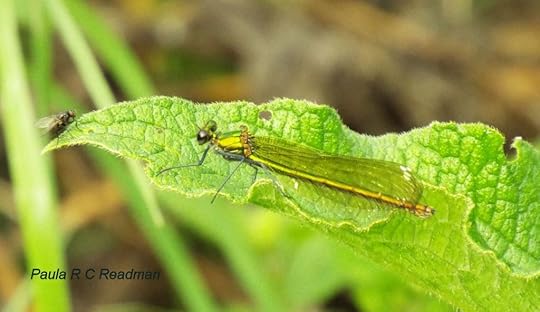 Emerald Damselfly
Emerald Damselfly
 Scorpionfly
Scorpionfly
June 13, 2021
Stone Angels by Paula R.C. Readman / #Interview @Darkfantasy13
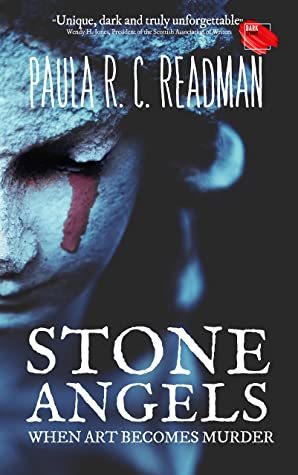
Is fame the perfect cover for murder? Artist, James Ravencroft, thinks so. As his reputation as a painter grows, so does his need to find the next …
Stone Angels by Paula R.C. Readman / #Interview @Darkfantasy13
June 12, 2021
Well, It’s Just Not Cricket!
 Cressing Church, Essex, England
Cressing Church, Essex, EnglandThis morning’s walk took us via Cressing Church. The church was built, between the 12th and 15th centuries, mainly of coursed flint rubble which contains some brick and tile. The south wall of the Chancel is partly of red brick, with dressings of limestone and clunch (a traditional building material of chalky limestone rock used in eastern England and Normandy), roofed with handmade red plain tiles. The north vestry is of gault brick (a thick, heavy clay, the first recorded use was in 1575) in Flemish bond. The Nave is thought to be 12th century, on a Saxo-Norman foundation. The Chancel is early 13th century, with its south wall being rebuilt in the early 16th century. The construction of bell-turret 14th/15th century.
 The Church Spire in detail.
The Church Spire in detail. In the graveyard, I noticed an interesting stone for a Sir Matthew Wood 4th Baronet. A couple of the others stone next to this one was also for Wood or Page Wood. What intrigue me most was the title baronet. What is a baronet?
Well it is one step up from being a commoner. A baronet is the lower a member of the lowest hereditary titled British order and basically you can call yourself, “Sir.” It’s a British hereditary dignity first created by King James I of England in May 1611. The baronetage is not part of the peerage, nor is it an order of knighthood.

 Sir Matthew Wood, 4th Baronet born 21th Sept 1857 Isle Wight, England
Sir Matthew Wood, 4th Baronet born 21th Sept 1857 Isle Wight, England


So who was Sir Matthew Wood and why was he buried here?
Matthew’s father was Sir Francis Wood, and his grandfather Sir John Page Wood (1796–1866), who became a Church of England vicar, Cressing, Essex. Matthew’s aunt, Katharine Wood (1846–1921) was better known by her married name of Katharine O’Shea. Popularly known as Kitty O’Shea, her relationship with the Irish leader Charles Stewart Parnell led to a political scandal which caused the downfall of Parnell who died not long after they married. Matthew’s uncle was Sir Evelyn Wood (1838–1919) was a Field Marshal and a recipient of the Victoria Cross.
Sir Matthew Wood (I better use his full title ) was an English first-class cricketer who played for Hampshire. He was a right-handed batsman but also was an underarm slow bowler. He died on 13th July 1908 Kensington, London.
) was an English first-class cricketer who played for Hampshire. He was a right-handed batsman but also was an underarm slow bowler. He died on 13th July 1908 Kensington, London.
Why was he buried here, and why a Celtic cross over his grave?
This could be because there was a big revival in the 1850s for Celtic crosses being used extensively as grave markers and monuments, and maybe as Cressing is a quiet out of the way place after such a full-on life for all members of the Wood/Page family so the churchyard was seen as an ideal place to be laid to rest, after all Reverend Sir John Page Wood had once ministered to the flock here.
 Sir John Page Wood, 5th Baronet was Matthew’s brother.
Sir John Page Wood, 5th Baronet was Matthew’s brother. And what is meant by It’s just not cricket? It’s an Australian slang for something that’s unjust, or doesn’t reach certain expected standard. This come from the fact a game of cricket is regarded as a gentleman’s game were everyone plays by the rules.
 Towards Egypt Farm
Towards Egypt FarmWe followed the path down the side of the church and walked through Egypt Farm onto the main road. The traffic races along here and as there is no pavement walkers have to be very careful. Ana and I had to stand well back, almost in to a ditch as the traffic came within a hair’s breadth of us. A tree growing close to the road stopped the on-come traffic from seeing us. It was quite scary for a moment.
Once we were able to cross the road, we followed the footpath known as Essex Way towards Bradwell, before heading back to Silver End. The heat was starting to rise even though it was still overcast with low cloud. The footpath opened up onto a grass edge field of rapeseed. Earlier in Spring this would have been a sea of yellow. Rapeseed is a bright-yellow flowering member of the family Brassicaceae, and is cultivated mainly for its oil-rich seed, which naturally contains appreciable amounts of erucic acid. While the rapeseed heads were ripening growing among them was the scarlet red of the poppy .
 Poppies among the rape seed heads.
Poppies among the rape seed heads. The field poppy sheds its petals after a day, but a vigorous plant may produce more than 400 hundred flowers in succession during a summer. Once a familiar sight modern farming use weed killers has made it less common.
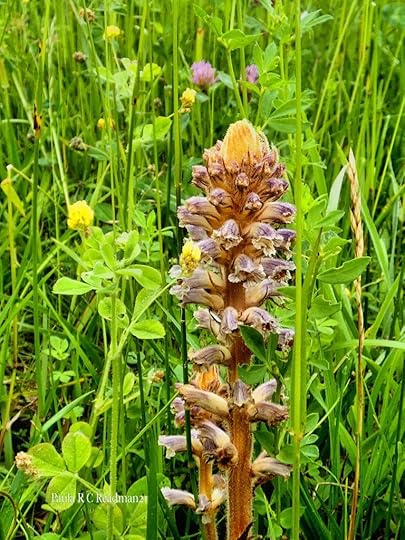 Common broomrape
Common broomrapeCommon broomrape to me is quite an amazing plant. There’s a dark beauty about it as its colours stand out among the greens. The plant is a parasitic Orobanche minor. Its other names are Lesser broomrape, Hellroot, Devil’s root, Hellweed, Herb bane The common broomrape is a variable, parasitic, non-photosynthetic, short-lived perennial with erect, leafless, reddish-brown, yellow-brown, pale yellow, or purple stems bearing terminal clusters of tubular, usually purple-flushed, cream flowers in winter and spring. The plant is toxic to grazing mammals. May cause severe discomfort if ingested by humans. The generic name Orobanche translated into English as vetch-strangler. The plant attaches itself to the host plant root system and feeds. the relationship between the two are finely balanced. if it removes too much nutrients its host will die, too little and it won’t be able to reproduce.
Our walk took 127 minutes and we covered 5 miles once I arrived home. Have a wonderful weekend. I shall be back soon to chat again.
June 8, 2021
The Voices In My Head.
 A Single Tear
on an Ox-eye Daisy
A Single Tear
on an Ox-eye Daisy When the voices in my head take over I have to step back and reassess my thoughts and actions. I’m not really any good at dealing with the actions of others. Neither, am I any good at holding my tongue, or dealing with the reactions voicing my thoughts might have bought on in others, so I normally walk away. Nature has always been my escape route and the only way I can deal with the conflict that rages in my head. Walking among Mother Nature’s beauty calms my trouble soul. As a child I would be out of the house and across the fields while my family slept. My mother said, she never needed to worry about me.
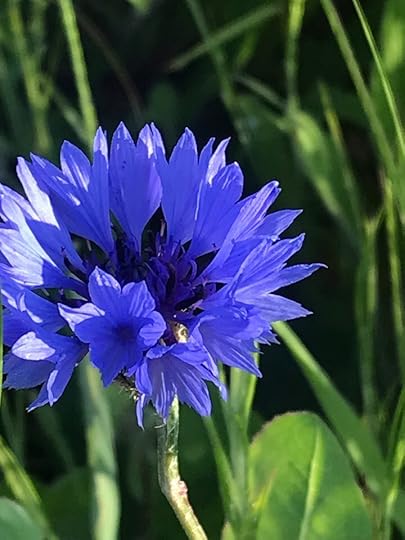 Cornflower
Cornflower
Writing helps me deal with a lot of my unresolved issues. My characters can deal with any problems I’m not dealing with well myself. My main problem is a desperate need to be an individual. To find my own identity and not follow the crowds, to carve out my own niche. This stems from the simple fact that there’s not quite two years difference between my sister and myself. For years, we were dressed as twins. My mother having lost twin babies may have enjoyed the fact my sister and I looked alike. People often asked her if we were twins. She would smile and nod, her own moment of fame that filled her need to stand out from the crowd.
Even at school, I was often mistaken for my sister. Without going into too much details my sister had her own issues and was a bit of a wild child. (I found out later that my mother was the same when she was young) At the age of thirteen, my sister ran away from home. This didn’t mean I was at last free to be myself. One day while minding my own business, I was walking home when a police car screeched to a halt beside me and two police officers jumped out. It was unnerving. They questioned me in the street, asking if I was her. They radioed in to check that what I had told them was true, I was indeed her older sister. I found it embarrassing. It happened on other occasions to until she was located in London, and taken to a children’s home close to where we lived.
It’s funny while writing this as it brings to mind the expression, “nature via nurture” which describes how much a person’s characteristics are formed by either nature, or how they are raised i.e. nurtured.
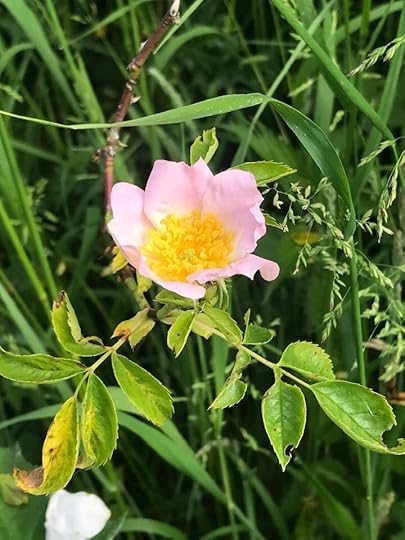 Nothing more beautiful than a English Dog Rose.
Nothing more beautiful than a English Dog Rose.
Which category do I sit most comfortable in?
I’m not sure, unless I can say I was raised by Mother Nature.
As a creative, whether you are a painter, storyteller, poet or playwright, we all stride to make our individual mark, to find our own voice. I crave this so completely. To be one’s self is difficult in a world where you have to conform to certain standards. The internet has allowed like-minded people to find their kindred spirit and to feel less alone in the world. I wish it has been around when I was young. Yes, it has its downside, but the creativity I see on YouTube is amazing. The art, poetry, mini films and storytelling allows individuals like me to have a platform to let it all out, if we are brave enough. I hope one day I will be able to join them and read my work aloud with more confidence.
I enjoy my own company, and books have always been my place of safety. Books give you friendship without expectations. It’s a one-sided affair. A book has a voice, but you choose the time and place to listen to what it has to say. Writing gives someone like me the opportunity to act out all the scenes in my head down on paper. To answers the voices once and for all in whichever way I want without repercussion.
Now I must get back to Granny Wenlock. She’s been calling to me.
Have a great day.
June 4, 2021
A New Meaning For The Word, Friendship
 Photo by fauxels on Pexels.com
Photo by fauxels on Pexels.comWhat does the word Friendship mean to you, I wonder?
For me, Friendship means trust, loyalty, understand, someone who is there to support you whether it just with a word of encouragement during a difficult time, or to share in a positive moment. Friendships can be long standing or new, but within them are certain unspoken boundaries. Like No Hard Sell or Cold Calling.
Why am asking this question?
Well, I think the word Friendship had been highjack, and abused on social media. I’ve recently had two people on two separate media accounts request my friendship. I hesitated over accepting them, but in the end I thought I can’t keep rejecting offers of friendship because who knows where it might lead.
What is my reason of hesitation?
Isn’t friendship a good thing?
It’s what comes next that disappoints me, but I’m getting use to it. The immediate hard sell. Whether it’s an author pushing me to buy their books, or a digital promoter offering me a special cut-price services. What I find so fascinating is the fact these hard-sellers haven’t give it much thought. Before making contact with me you would’ve thought they might have google of my name, or a check of my profile to find out the relevant information. The author pushing their books would know I have my own to sell. The promoter would know I’m all over the place promoting my own books. And as many of them do, I’m busy promoting in the same places they’re offering, at a price, to promote my books.
Yes, I do check them out before accepting their Friendship, and have deleted rather a lot of requests of the years, if it is clear that they will be offering me services or Please, Buy-MY-Book Ads.
 Photo by Anna Nekrashevich on Pexels.com
Photo by Anna Nekrashevich on Pexels.comWhen I request a friendship on the internet, I don’t see it as somewhere else I can market my books. If I’m going to market my work I seek out places which are for writers and readers to either promote or buy books. Though these places can be a bit of a trap too if you’re not careful. I’ve been caught out twice. Someone offered to buy my book in exchange for me read their book, and giving them a honest review. That in itself is the first problem. a) they want a five stars review b) they don’t want to read your book or buy it c) they want you to buy theirs.
I’m a little too old fashioned, and honesty is a weakness of mine. a) I bought the book, b) photograph my kindle to prove it was on it c) read the book which was good, but not brilliant. It had quite a few issues and needed a good editing. d) I messaged them to explain I couldn’t give them a five star review because of the issues but I would give it a three stars. e) Not what they wanted to hear.
Never again. I’ve decided I will only market my books on marketing sites.
Here on my blog, you’ll see my book covers decorating the edge of the page, if you’re on a computer or laptop. If you’re on a phone or Ipad they will appear below the blog posts. By click on the covers of each book, you’ll be taken to an Amazon site in whichever country you’re in. This is the most promoting I will do to you. The choice is you, whether you buy or not.
 Days Pass Like A Shadow has its tenth review: I’m so happy
Days Pass Like A Shadow has its tenth review: I’m so happy 
I may share my book news with you, chat about book trailers I’ve made, and tell you news about new reviews I’ve had, but I hope you won’t see this as hard sell, or in your face promoting.
I will tell you about my books’ ratings, and about new books I’m writing which I hope you will find interesting. I will share another author’s chats and book launches with you. But I will never hard sell to you.
Thank you for your Friendship, and sharing my writing journey with me.
I value your thoughts, and please tell me if you have received requests of friendships only to find out it has been just a case of hard sell or cold calling.
Have a great weekend.
June 2, 2021
🎵Slow Down, You’re Moving Too Fast.🎵
The trouble with me is I hate wasting time. Everything has to be done yesterday, if not sooner. I hate waiting for others to help, and I’ve learnt not to expect help from others. My mother was fond of saying, ‘If you want it done, do it yourself.’ Maybe she was always told this when she asked for help, so in return she gave me the same advice. Over the long weekend I wanted to get a certain amount of jobs done around the garden. My husband had work on Saturday so I got on with things. As Russell works all week, so I don’t like to ask too much of him as he needs time to chill out too.
 Swallow
s: One Swallow doesn’t make a summer.
Swallow
s: One Swallow doesn’t make a summer.Now that the summer is with us, I have to be careful as I find the heat very draining. After the weekend I planned to focus on writing the Granny Wenlock novel, but on returning home from a long walk yesterday I took to my bed. I hate being ill, unable to do anything, but lay on the bed, as even thinking hurts.
After a rough night my husband left me to sleep when he went off to work. I got up just after eight o’clock this morning and have been potting about the house and garden. I’m hoping after a good night sleep I shall be back on form and get back to Granny. I’m taking it slow today.
Chat again soon.
May 31, 2021
Wow, What a workout!
After a busy long weekend, I’m ready to get back to my keyboard. It was a hot weekend. The first hot weather we’ve had for a long time. The only problem with the weather being so lovely is that Britain may have to go into another lockdown as there has been an increase in the number of COVID-19 cases.
Over the weekend, my husband and I have been busy in our garden. Little jobs that needed warm dry weather to do like painting garden furniture, gates and fences. Unfortunately, we didn’t have enough painting to finish off two pieces of furniture and one gate. Hopefully, the weather will still be okay to complete these tasks next weekend.
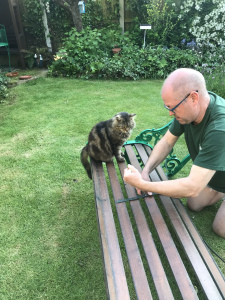 Brutus, our cat, thinks he’s helping my husband put the bench back together
Brutus, our cat, thinks he’s helping my husband put the bench back together Today, after a walk, I must focus on my new novel, As the crow flies. I’ve rewritten the opening and now I’m much happier with the flow. Now I’ve got this right hopefully the rest will fall into place as I know where the story is taking me. I know I will have problems get the time lines to flow naturally from one to another but I’m hoping my reader will come onboard, once they are into the story and are intrigued enough to want to know what happens next. Well, that’s the plan.
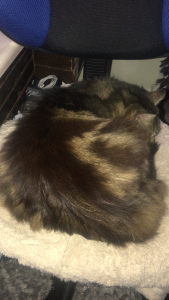 Brutus is a rescue cat. His owner neglected, and then dumped him on us. We were happy to having him become part of our family.
Brutus is a rescue cat. His owner neglected, and then dumped him on us. We were happy to having him become part of our family. Brutus often keeps me company in my writing room as long as I give up my seat for him.  Next time I will introduce you to Willow. She’s quite a little princess. Have a great day and I will catch up with you again soon
Next time I will introduce you to Willow. She’s quite a little princess. Have a great day and I will catch up with you again soon 
May 29, 2021
In the garden.
It’s a bank holiday weekend here in Britain so I’m busy in my garden. After weeks of rain we are having some beautiful sunshine. Today is a Sunday. I’m sitting here writing this before I go out to clean out my greenhouse before it gets too hot.
Yesterday morning, my husband had work so I did so work on my Granny Wenlock book before going outside. I’m pleased with my progress on the book, though it is much slower than I would like but I have a lot on at the moment. I’ve been busy painting fences and garden furniture.
My writing group will be meeting up at the end of June for the first time in over a year. As we will be meeting outside I want the garden to look tidy so I’ve been busy getting it ready.
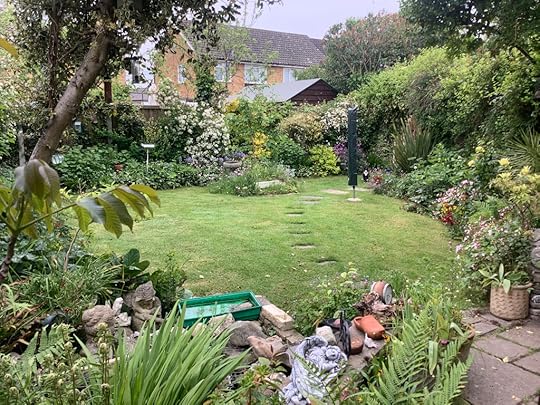 My garden
My garden I paid to have an advertisement put in a magazine I hadn’t heard of before. For the money I paid I was surprised and pleased with the quality of the advertisement which is published both online and in a physical magazine. Fingers crossed that it does generate some sales.
 To buy please click on this Link
To buy please click on this LinkHave a great day and I will chat again with you soon
May 26, 2021
A Guest’s Book Chat: Fiona McNeill talks about her book, Last Chance Salon and other stories,
Welcome to Clubhouse Chat page. Those of you who are not a member won’t be aware that the location of the Clubhouse is shrouded in mystery. The only way to visit it is via membership or an invite to the tearoom. Every few days, I’ll be sharing a conversation with all sort of writers and authors at different levels of their writing careers. Over tea and cakes, or maybe a glass of something stronger, I shall be chatting with my guest about their work in progress, or latest book release.
 Photo by Toni Cuenca on Pexels.com
Photo by Toni Cuenca on Pexels.comToday, we’re here to chat about Last Chance Salon and other stories. Welcome Fiona
Thanks you for inviting me to your tearoom, Paula.
Let’s order our drinks. What would you like? What’s your favourite?
Hmm, my favourite drink? I would love to choose gin and tonic. Though in real life, I can’t touch alcohol. It gives me a migraine! I miss the days when I could enjoy a drink so a virtual G & T is the next best thing.
Now we have our drinks could you tell us whether you write a synopsis first, write the first chapter, or do you let the characters lead you?
I don’t plan anything – I like to see what emerges!
Choosing only five of your favourite authors. Can you list them in order 1 begin the top of your list and say how have they influenced your writing?
It’s very difficult to choose just five writers, let alone putting them into an order! Writers I admire include the following – Tove Jansson – ‘The Summer Book’ and ‘The Winter Book’ are really original, quirky and understated. Alice Thomas Ellis – ‘The Clothes in the Wardrobe’ has a tight plot and lots of subtly-suggested themes. Elizabeth Strout – ‘My Name is Lucy Barton’ is subtle, deceptively straightforward and moving. Poet Hugh MacDiarmid – ‘Crystals Like Blood’ is such a clever poem. It shows that plain words on a seemingly everyday topic can still evoke strong emotions. E.L. Doctorow – a short story called ‘The Writer in the Family’ is an all-time favourite. Again, it’s understated, cleverly put-together and very moving.
 Fiona McNeill
Fiona McNeillWere any of your characters inspired by real people?
All my characters are inspired by real people. Sometimes a particular person is the starting point for a character which then ‘mutates’ into their own person, at other times, a character is an amalgam of different people I’ve met. The lead character in the title story of this collection, ‘Rafe Bunce’ was inspired by TV designer Laurence Llewelyn- Bowen, for example. I remember watching him on telly one day and noticing how he seemed genuinely concerned that a client didn’t like one of his designs. It was that combination of flamboyance and sensitivity that inspired the invention of Rafe – but I have no idea what LLB is like in real life!
What did you learn when writing your book (story, play or poem)? In writing it, how much research did you do?
I didn’t do any formal research but when the book was being prepared for publication, the editor pointed a few things out to me that I didn’t know – for example, I hadn’t realised that you couldn’t quote a line from a song without paying for it. This was a bit of a blow as I had to take them out!
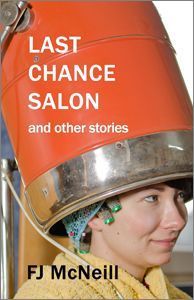
Is there anything about you your readers might be surprised to find out?
Some friends and acquaintances don’t know that my stories have been published – I’m too shy to say! In a strange way, I feel this allows me to keep writing and doing my ‘thing’ without feeling self-conscious. Perhaps other writers can relate to that?
Did you uncover things about yourself while writing your books (or stories, play, poem) whether that be a long forgotten memory, a positive experience etc.
Writing this collection, I realised how much south London had influenced me over the years – people and the way they talk and behave, as well as the place itself.
What is your work schedule like when you’re writing?
I don’t have a schedule when working on something creative – I fit writing in where I can and when I feel like it.
How many hours in a day do you write?
I work as a journalist so I often spend several hours a day writing factual stuff.
Did you ever consider writing under a pseudonym?
I’m quite shy and I always thought that if my books were ever published, I would use a false name. Once this collection was accepted for publication, I decided to use my real name. I think it was about wanting to be brave. Pushing myself forward and answering these questions has also taken a lot of courage!
Tell us a little about your latest writing project. Is it a new idea, or one you have been mulling over for some time?
I used Rafe Bunce, the main character from this collection, in a novel which I finished a few years ago. He’s a big kid and a self-confessed ‘ham’ and I felt I’d enjoyed his company so much that I wanted to see what he got up to next! I’m thinking of going back to the book to make some changes.
Thank you for joining me for a chat, Fiona.
To find out more about Fiona and her writing please click on her Amazon link
If you want to find out more about Clubhouse Members’ Books, don’t forget to check out the Clubhouse Bookshops, too.

